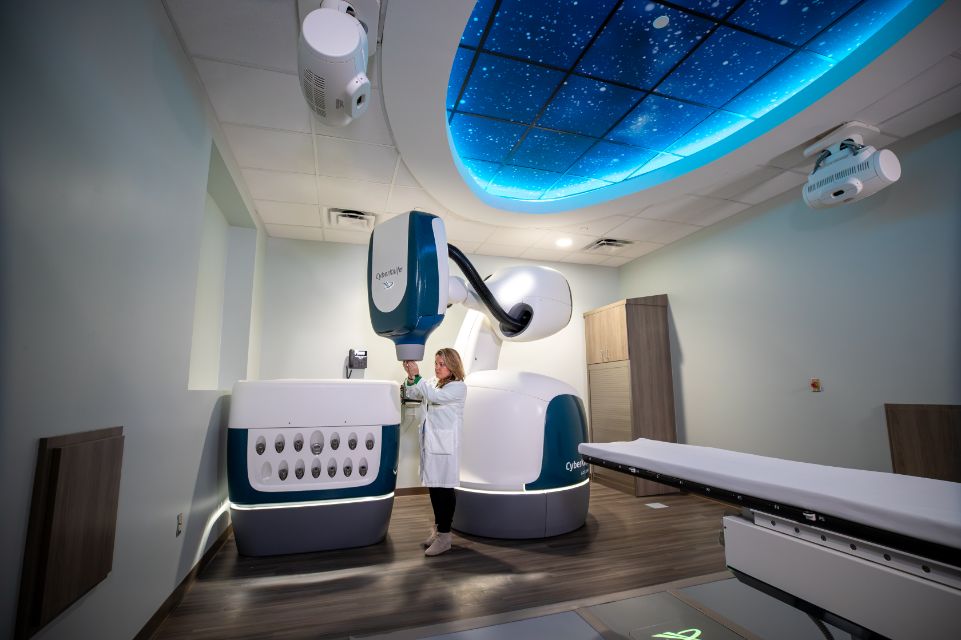In the War on Cancer, Tampa General Hospital Cancer Institute Employs AI in its Newly Established Center for Precision Radiosurgery
Published: Jan 25, 2024
Radiation Oncology experts will use the CyberKnife S7 to treat patients with benign and cancerous tumors and neurologic disorders.
Tampa, FL (Jan. 25, 2024) – Going under the knife is taking on a new and more promising meaning at Tampa General Hospital (TGH) Cancer Institute, where doctors are using a sophisticated AI-driven tool to treat cancer.
The CyberKnife S7 is a robotic, non-invasive radiation therapy device that employs real-time, AI-driven motion tracking and synchronization treatment delivery for stereotactic radiosurgery (SRS) and stereotactic body radiation therapy (SBRT) treatments. It is capable of treating cancerous and benign tumors throughout the body, as well as neurologic disorders, in as little as 15 minutes. The tool, through its speed and advanced precision, is expected to expand the capabilities of Tampa General Cancer Institute’s newly established Center for Precision Radiosurgery, said Dr. Richard Tuli, professor and chair of the Department of Radiation Oncology at USF Health Morsani College of Medicine, deputy director of the TGH Cancer Institute, and director of Radiation Oncology at Tampa General. Tuli joined TGH from Memorial Sloan Kettering Cancer Center in New York, N.Y.
“It’s another example of providing our patients with the best possible care across the Tampa Bay region and the state,’’ he said. “Using true robotic precision for personalized therapy, this new Cyberknife S7 is at the forefront of treating tumors, and greatly enhances what the TGH Cancer Institute can offer as an alternative to treating difficult tumors that are otherwise difficult to reach with more conventional cancer treatments.”
CyberKnife S7, made by a company called Accuray Incorporated, can be used to treat cancerous and non-cancerous tumors throughout the body including the prostate, lung, brain, spine, head, neck, liver, kidney and pancreas. It can be an alternative to surgery or for patients with inoperable or surgically complex tumors. Treatments are typically performed in one to five sessions.
Many changes can happen during treatment – the patient shifts position, breathes, or coughs, muscles tense and relax, and fluids and gasses displace internal organs. This movement can affect the location of the tumor target when the radiation beam is delivered. The CyberKnife S7 tracks these changes and adapts in real time throughout the course of treatment, making a procedure more effective and less risky.
“This is a highly advanced and accurate oncology tool,’’ said Dr. Brian Collins, a board-certified radiation oncologist who is a professor of Radiation Oncology and director of CNS Oncology & Radiosurgery, USF Health Morsani College of Medicine and director of Stereotactic Radiosurgery, Tampa General Hospital Cancer Institute. “Ten years ago, no one would have thought this kind of technology was possible.’’ Stereotactic radiosurgery is a precise form of therapeutic radiation that with the incorporation of real time tracking and the use of AI, as in the case of CyberKnife S7, has made this procedure even more accurate” said Dr. Collins, who joined USF Health and the TGH Cancer Institute from the Lombardi Cancer Center at Georgetown University in 2023.
The system’s robotic design allows the delivery of radiation from potentially thousands of unique angles, significantly expanding the possible positions from which radiation beams can be delivered to the patient. With more angles and points in space from which to approach the tumor, the physician can deliver a highly targeted radiation dose to the tumor while protecting surrounding healthy tissue.
“The establishment of the Center for Precision Radiosurgery at TGH Cancer Institute and the ability to provide precision treatment with the Cyberknife S7 highlight our unwavering commitment to a highly personalized, innovative and compassionate cancer care that meets the unique need of each patient,’’ said Dr. Eduardo Sotomayor, vice president and executive director, TGH Cancer Institute.“
The TGH Cancer Institute’s Radiation Oncology platform offers a full complement of services to treat all types of cancers, offering evidence-based, multidisciplinary care incorporating cutting-edge radiation therapies. This also includes the TrueBeam™ system, high-dose-rate (HDR) brachytherapy and radiopharmaceuticals, as well as the planned 44,000-square-foot Proton Therapy Center adjacent to downtown Tampa.
In 2023, the TGH Cancer Institute completed a satellite location at the TGH Outpatient Center in Brandon featuring advanced equipment and services including a 26-bay Infusion Center, a Radiation Oncology Center, and experts in breast cancer, lung, gynecologic and colorectal cancers, head and neck cancers, sarcomas, abdominal cancers such as liver and hepatobiliary, urologic and genital cancers, blood cancers, and brain tumors.
All are part of the hospital’s expanding footprint and patient-centric services, said Dr. Abraham Schwarzberg, executive vice president, chief of Oncology and president of the Tampa General Provider Network (TGPN).
“As one of the nation’s leading academic medical centers, we are focused on driving innovation to give patients the finest treatment options possible, and this is a perfect example,” he said. “Our Radiation Oncology enhancements, including CyberKnife, show how we are bringing the most advanced resources directly to those who need them the most.”
